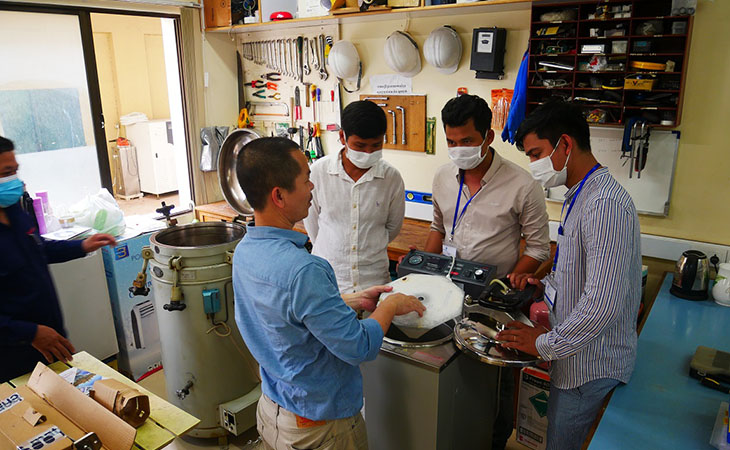Training of trainers on maintenance and calibration in Cambodia


Cambodia
November 18, 2021
A Training Need Assessment involving the BMLS and 5 selected hospitals was conducted in September to establish a list of priority trainings. These 5 laboratories rated each topic to define a common list for the SEALAB in-service training course. It is worth noting that all topics on maintenance and calibration received the highest score by all laboratories, demonstrating that preventive maintenance is a real concern and an identified weakness in medical laboratories of public hospitals.
For this reason, the SEALAB training of trainers for maintenance and calibration was organized at the Institut Pasteur in Cambodia from October 18-21, 2021 for the first group of lab technicians and from October 25- 28, 2021 for the second group.
The trainers involved in the training were:
The training modules were divided into an academic and Q/A session in the morning followed by a demonstration and practice session in the afternoon addressing four topics:
Mr. Kean and his team demonstrated how to understand the results of the functionning of the various components of the equipment for efficient preventive maintenance. Additionally, the module on calibration highlighted that accurate pipettes and precision scales are the starting point of accuracy.
The trainees requested to visit the IPC maintenance team to assist them to perform calibration and preventive maintenance on their own lab equipment for practice and to sensitize the other lab technicians.
However, the benefit of such training is limited due to the lack of basic equipment, for example a set of certified mass. This gap will give an opportunity for a collaboration for SEALAB on a similar project to be implemented by GIZ on laboratory strengthening. Several meetings have been organized between Mérieux Foundation and GIZ to prevent duplicating activities. A joint maintenance unit equipped with common measuring instruments supplied by GIZ has been created which will be a good start for developing synergy between both projects.